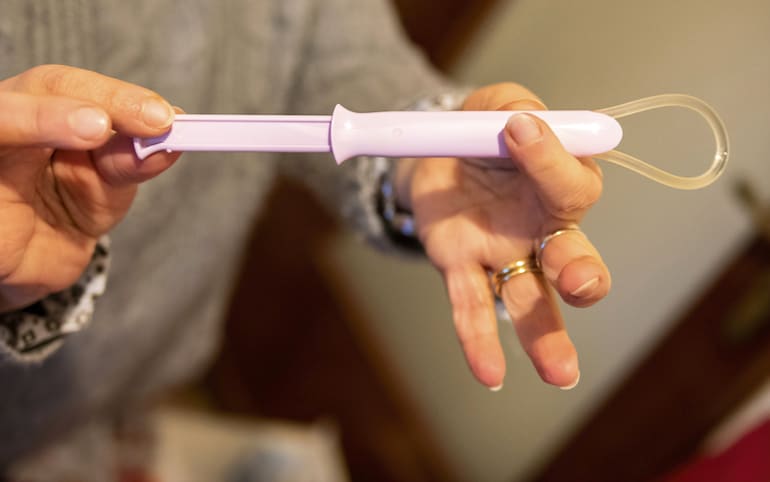Curious about the different kinds of birth control? How about what you can expect from each?
We asked two OB-GYNs all about the pros and cons of seven types of birth control for women. By the end of this article, we hope you’ll have a better sense of which kind may work best for you.
But first, let’s set the record straight on a common myth about birth control and fertility.



Does birth control affect fertility later in life?
You may have heard that taking birth control can wreak havoc on your chances of conceiving a child. Yet according to Barry R. Witt, MD—a board-certified OB-GYN and reproductive endocrinologist—that’s simply not the case. “Contraceptives have no long-term negative impact on fertility,” reassures Dr. Witt, who’s also a medical director at WINFertility and has been offering reproductive care for over 25 years. “These include oral contraceptives, IUDs, and contraceptive implants.” However, irreversible sterilization procedures—such as bilateral tubal ligation (BTL)—will absolutely cease any chances of conceiving. Now that we have this myth out of the way, let’s talk about different types of birth control.
7 Different Types of Birth Control
1. Birth Control Pills
What They Are
Oral pills that suppress ovulation and thicken cervical mucus to make it less penetrable by spermPros
- Not invasive (unlike implants and IUDs)
- May lessen severity of PMS symptoms
- May reduce menstrual bleeding and cramping/pain
Cons
- Less effective if not taken consistently
What Doctors Say
“If you forget to take the pill within the same 12-hour window, the pill loses its efficacy and a backup method should be considered,” warns fertility specialist and board-certified OB-GYN Lucky Sekhon, MD. And in terms of progestin-only pills (which she says are a good option for anyone with underlying medical risk factors for exposure to estrogen), the window shrinks to just three hours. Next, if pregnancy is a goal for the future, Dr. Witt reiterates that there’s no cause for concern if you’re currently taking birth control pills. “After discontinuing oral contraceptive pills, fertility returns within a few months once ovulation returns. There are some women who are on oral contraceptive pills for years whose menstrual periods don’t return, but it’s not a result of the pills.” Instead, he continues, “It’s a result of the fact that oral contraceptive pills result in regular periods regardless of the underlying ovarian function. So the pills will mask hormonal abnormalities like polycystic ovarian syndrome (PCOS), for instance. “Once the pills are discontinued, those women will exhibit signs of not ovulating because of the underlying hormonal abnormalities, [rather than as] a result of previous birth control pill use.”
2. Barrier Methods
What They Are
Male and female condoms (like diaphragms)Pros
- Price
- Protection against STIs
Cons
- Can break
- May reduce sensitivity
- May cause an allergic reaction
What Doctors Say
“You can leave a diaphragm in place for up to 24 to 48 hours,” says Dr. Sekhon. It’ll also “provide protection against conceiving from multiple acts of intercourse.” Just note that you must leave a diaphragm in place for at least four hours after sex.3. Contraceptive Implants
What They Are
Long-term birth control implants that release hormones and protect against pregnancy (such as IUDs and Nexplanon, an arm implant)Pros
- Most effective contraceptive method
Cons
- Side effects include irregular bleeding, breast tenderness, breakouts, bloating, and weight gain
What Doctors Say
“The major advantage of these LARCs (long-acting reversible contraception)—compared with other reversible contraceptive methods—is that they don’t require the woman to do anything once they’re inserted or implanted,” Dr. Witt explains. If you struggle with taking birth control pills consistently, for instance, contraceptive implants may be a better alternative. Dr. Witt also notes that they’re approved for 10 years of continuous use. “They need to be inserted or implanted (and removed) by a healthcare professional. Once the device is removed, the return of fertility is rapid.”4. Contraceptive Sponge
What it is
A spermicide-soaked sponge that blocks and kills sperm before it can enter the reproductive tractPros
- Inexpensive
- Can be left in place for a day
- Protects against multiple exposures to sperm
Cons
- Doesn’t protect against STIs
- May cause an allergic reaction or sensitivity
- Can be messy
What Doctors Say
After wetting the sponge to activate the spermicide, manually insert the sponge (strap side down, dimple up) immediately or up to 24 hours before having sex. Dr. Sekhon advises that you must keep contraceptive sponges in place for at least six hours post-intercourse to be effective. Gently pull on the strap to remove it.5. Birth Control Patch
What it is
An estrogen and progestin patch that prevents ovulation and thickens cervical mucusPros
- Mild or no side effects
Cons
- Potential side effects include nausea, headaches, and/or breast tenderness
What Doctors Say
The birth control patch releases enough hormones for one week. Be sure to change the patch on the same day each week. Further, if you prefer to get your period, don’t apply a patch for week four. Conversely, you can continue to apply it that week to avoid getting your period. Both methods are safe and effective to prevent pregnancy. Finally, side effects aren’t always present. Yet if they are, Dr. Sekhon says that they tend to be stronger in smokers.
6. Vaginal Ring
What it is
A flexible ring placed vaginally for three weeks of protection at a timePros
- Can cause lighter periods
- May reduce PMS symptoms
Cons
- Side effects include breast tenderness and headaches
What Doctors Say
Like birth control pills, Dr. Sekhon says that vaginal-ring insertion calls for one week of removal to allow for a period. “It releases both estrogen and progesterone to prevent ovulation, uterine thickening, and causes thickening of cervical mucus,” she says.7. Depo-Provera Injection
What it is
A pregnancy-prevention injection administered every three monthsPros
- Long-lasting protection against pregnancy
Cons
- May suppress ovulation
What Doctors Say
“The one contraceptive that may have a prolonged suppression of ovulation for many months after [discontinuation] is Depo-Provera,” Dr. Witt shares. “Fertility may take some time to return, as some women will have ovulation suppressed for up to six months or longer after discontinuing it.” If pregnancy is your goal for the near future, it’s probably best to take this birth control method off the table.The Bottom Line
Now that you know about the different types of birth control to choose from, it’s only a matter of deciphering which method works for you. At the end of the day, you should always consult your OB-GYN. Be sure to discuss not only birth control benefits, but potential side effects too.More like this









